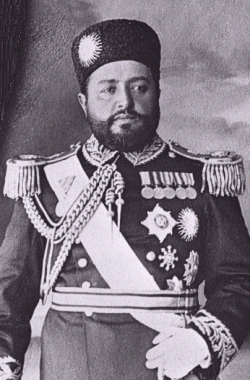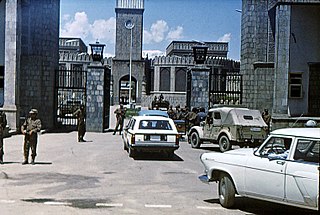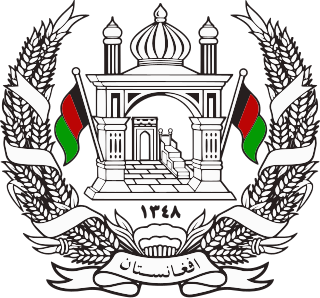
Kabul is the capital city of Afghanistan. Located in the eastern half of the country, it is also a municipality, forming part of the Kabul Province; it is administratively divided into 22 municipal districts. According to 2023 estimates, the population of Kabul was 4.95 million people. In contemporary times, the city has served as Afghanistan's political, cultural, and economical center, and rapid urbanisation has made Kabul the 75th-largest city in the world and the country's primate city.

Mohammad Najibullah Ahmadzai, commonly known as Dr. Najib, was an Afghan politician who served as the General Secretary of the People's Democratic Party of Afghanistan, the leader of the one-party ruling Republic of Afghanistan from 1986 to 1992 and as well as the President of Afghanistan from 1987 until his resignation in April 1992, shortly after which the mujahideen took over Kabul. After a failed attempt to flee to India, Najibullah remained in Kabul. He lived in the United Nations headquarters until his assassination during the Taliban's capture of Kabul.
The following lists events that happened during 1996 in Afghanistan.

Habibullah Khan was the Emir of Afghanistan from 1901 until his assassination in 1919. He was the eldest son of the Emir Abdur Rahman Khan, whom he succeeded by right of primogeniture in October 1901. His grandfather was Mohammad Afzal Khan.

The prime minister of Afghanistan, officially the prime minister of the Islamic Emirate of Afghanistan, is the head of government of Afghanistan.

Colonel General Abdul Kadir Dagarwal was an Afghan politician, diplomat, and a military officer in the Afghan Air Force who participated in the coup d'état that created the Republic of Afghanistan under the President Dawood Khan, and later directed the Afghan Air Force and Army Air Corps squadrons that attacked the Radio-TV station during the Saur Revolution.
Dawi is a Gharghasht Pashtun tribe and the brother of the Kakar tribe. Both are the sons of Gharghasht tribe. The population of Davi tribe is almost equal to that of the Kakar tribe but apparently seems smaller than Kakar because of the close ties of both tribes; they intermingled and mixed so closely that most Davi tribesmen consider themselves as part of Kakar tribe. Therefore, a large portion of Davi tribe is part of Kakar. The ancestral property of Daavi tribe is located at Kakar Khurasan in district Zhob where one dam on the name of "Daavi Dam" is located which was constructed some four hundred years ago.
Faiz Ahmad was an Afghan politician who led the Afghanistan Liberation Organization (ALO), a Marxist–Leninist organization established in Kabul.

The Saur Revolution or Sowr Revolution, also known as the April Revolution or the April Coup, was staged on 27–28 April 1978 by the People's Democratic Party of Afghanistan (PDPA) and overthrew Afghan president Mohammed Daoud Khan, who had himself taken power in the 1973 Afghan coup d'état and established an autocratic one-party system in the country. Daoud and most of his family were executed at the Arg in the capital city of Kabul by Khalqi military officers, after which his supporters were also purged and killed. The successful PDPA uprising resulted in the creation of a socialist Afghan government that was closely aligned with the Soviet Union, with Nur Muhammad Taraki serving as the PDPA's General Secretary of the Revolutionary Council. Saur or Sowr is the Dari-language name for the second month of the Solar Hijri calendar, during which the events took place.
The following lists events that happened during 1922 in Afghanistan.

The Barakzai dynasty also known as the Muhammadzai dynasty ruled modern day Afghanistan from 1823 to 1978 when the monarchy ended de jure under Musahiban Mohammad Zahir Shah and de facto under his cousin Sardar Mohammad Daoud Khan. The Barakzai dynasty was established by Dost Mohammad Khan after the Durrani dynasty of Ahmad Shah Durrani was removed from power. As the Pahlavi era in Iran, the Muhammadzai era was known for its progressivist modernity in which Afghanistan was referred to as the "Switzerland of Asia".
ʻAbd al-Hādī is a Muslim male given name, and in modern usage, surname. It is built from the Arabic words ʻabd and al-Hādī, one of the names of God in the Qur'an, which give rise to the Muslim theophoric names. It means "servant of the Guide".
Abdul Hadi Dawi was an Afghan poet, diplomat and government official. His works were published under his pen name, Pareshan (worried).

The Embassy of the Islamic Republic of Afghanistan in Washington, D.C. was the primary diplomatic mission of the Islamic Republic of Afghanistan to the United States. The building is located at 2341 Wyoming Avenue N.W. in Washington, D.C.'s Kalorama neighborhood. The chancery is built in the Colonial Revival style.

The Republic of Afghanistan was the first republic in Afghanistan. It is often called the Daoud Republic or the Jamhuriyye-Sardaran, as it was established in July 1973 after General Sardar Mohammad Daoud Khan of the Barakzai dynasty alongside senior Barakzai Princes deposed his cousin, King Mohammad Zahir Shah, in a coup d'état. The occcasion for the coup was the 1964 Constitution of Afghanistan, that took power from most members of the royal family, in favour of the centralization under Zahir Shah and his offspring under the tenet of democracy. Daoud Khan was known for his autocracy and attempts to modernize the country with help from both the Soviet Union and the United States, among others.
Parliamentary elections were held in Afghanistan in August and September 1965. Members of the Senate were elected between 26 August and 7 September, and members of the House of the People elected between 10 and 26 September. Following the introduction of women's suffrage in the 1964 constitution, four women were elected to the House of People and two became members of the Senate.

The 1973 Afghan coup d'état, also called by Afghans as the Coup of 26 Saratan and self-proclaimed as the Revolution of 26 Saratan 1352, was led by Army General and prince Mohammad Daoud Khan against his cousin, King Mohammad Zahir Shah, on 17 July 1973, which resulted in the establishment of the Republic of Afghanistan under a one-party system led by Daoud Khan.

Amir Khan Muttaqi is an Afghan Taliban politician serving as acting Minister of Foreign Affairs of the Islamic Emirate of Afghanistan since 7 September 2021. He was also a member of the negotiation team in the Qatar office.












